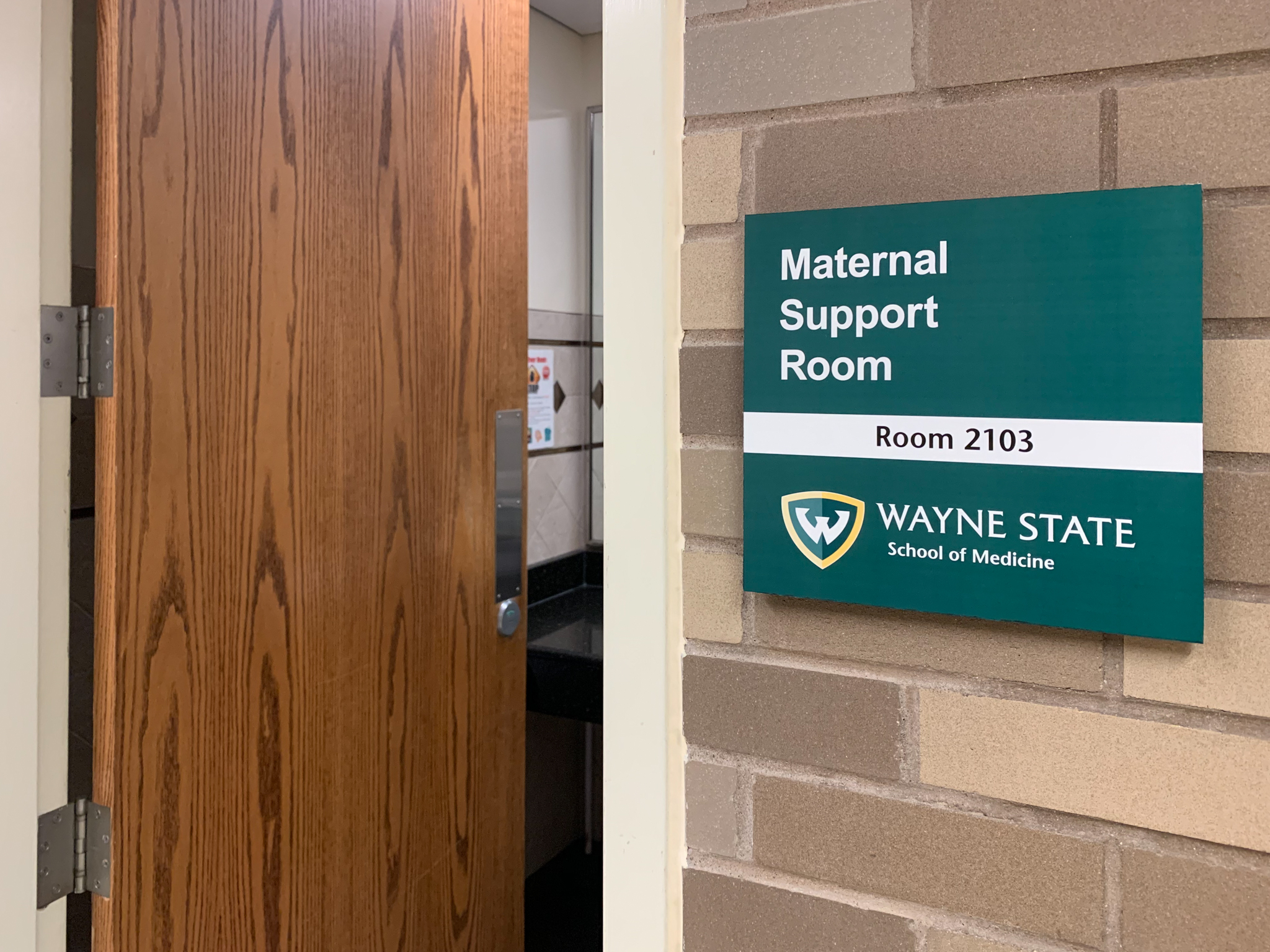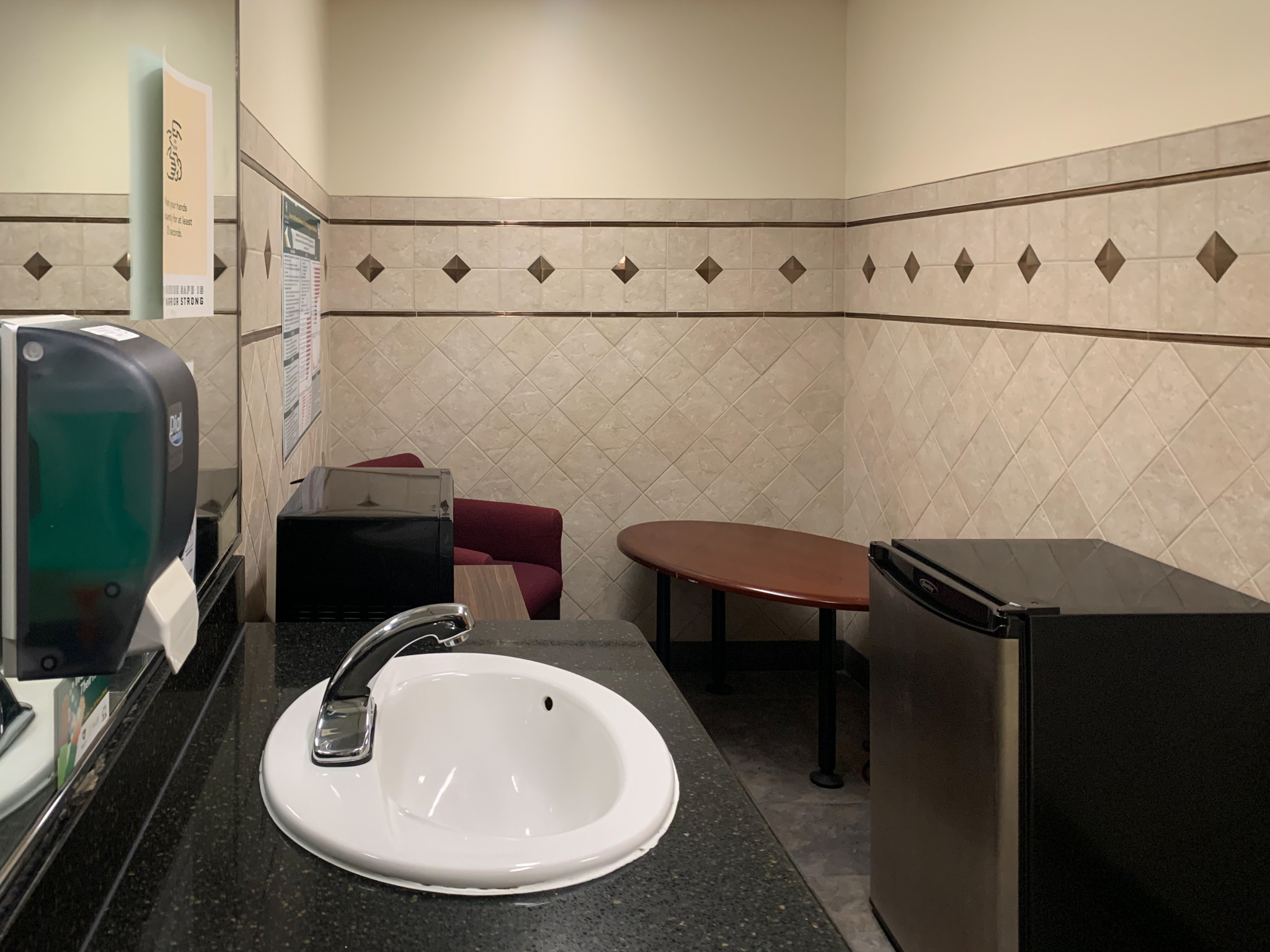The Wayne State University School of Medicine opened a Maternal Support Room within Scott Hall, coinciding with National Breastfeeding Awareness Month.
Room 2103, the first of its type on the medical campus, was celebrated with an Aug. 10 ribbon-cutting ceremony that included Dean Mark E. Schweitzer, M.D., and those who worked to secure the facility. Participation in the event was limited because of the ongoing pandemic.
Many working and student mothers who would like to breast feed their infants for the known health benefits have found expressing milk at work or school is either inconvenient or impossible given the need for privacy, refrigeration of milk and the need for running water.
School of Medicine students researched the topic through a study titled “Barriers to Women’s Advancement: Breastfeeding Support at the Workplace.” Based on insights derived from the study, including data from working and student mothers and an investigation of lactation spaces available at WSU, the study was released in conjunction with the opening of the new room. Understanding the difficulty mothers face as they endeavor to nurse for their infant’s health while working or completing their education, students and faculty associated with the study acted on their findings and presented the need for additional lactation and nursing spaces available to mothers.
“The Wayne State University School of Medicine takes great pride in its 152-year mission of community care and working to resolve health disparities. Our faculty and students are greatly invested in resolving real-life issues,” Dean Schweitzer said. “Today’s ribbon-cutting is evidence of this approach as this room will benefit the health of mothers and their children for decades to come. We recognize the importance of supporting nursing mothers by providing space to breastfeed, which has been shown to offer numerous health benefits for infants. As nursing mothers return to campus as faculty, physicians, physicians-in-training and staff, this room and all the WSU campus locations like it are concrete examples of our belief in creating health equity and extending support for diversity.”
Dean Schweitzer also thanked Beena Sood, M.D., professor of Pediatrics and associate dean for Professional Development in the Office of Faculty Affairs and Professional Development, for her drive to establish the Maternal Support Room.
 Dr. Sood has chaired the Women in Medicine and Science group at the School of Medicine since 2015. She has collaborated with other groups on campus to explore gender equity initiatives. She helped lead an analysis of the gender pay gap at WSU and showed that lack of professional advancement opportunities for women was the most powerful determinant in pay disparities. The results were presented at national conferences and to the university’s president and provost. Under her leadership, the WIMS Advisory Group has organized lectureships, workshops, panel discussions and book clubs to engage faculty in diverse topics, including gender pay gap, negotiation skills, climbing the academic ladder, work-life balance, getting to the C Suite and under-representation of women in surgical specialties.
Dr. Sood has chaired the Women in Medicine and Science group at the School of Medicine since 2015. She has collaborated with other groups on campus to explore gender equity initiatives. She helped lead an analysis of the gender pay gap at WSU and showed that lack of professional advancement opportunities for women was the most powerful determinant in pay disparities. The results were presented at national conferences and to the university’s president and provost. Under her leadership, the WIMS Advisory Group has organized lectureships, workshops, panel discussions and book clubs to engage faculty in diverse topics, including gender pay gap, negotiation skills, climbing the academic ladder, work-life balance, getting to the C Suite and under-representation of women in surgical specialties.
The breastfeeding support in the workplace research came about, Dr. Sood said, as a result of her dual role as a neonatologist and as chair of the WIMS group, coupled with her own experience when, as a resident in Pediatrics at the Detroit Medical Center, she used a restroom to express milk for her infant between seeing patients. That, and other experiences, she said, left her so traumatized that she elected to take a year off after the birth of her second child.
“As a neonatologist, I have made rounds at Hutzel Women’s Hospital, a baby-friendly hospital where we encourage all mothers to breastfeed their newborn babies,” Dr. Sood said. “We provide breast pumps to all mothers who cannot afford one to ensure that they continue to provide breast milk for their baby after discharge. Many mothers go back to work or to school after delivering a baby. I wondered whether these mothers were actually able to use their breast pumps at work and at school? Were they allowed breaks and were they provided a space to express breast milk?”
At that time, a WSU medical student, Margarita Abella, approached Dr. Sood about a summer research project. Together, they developed a two-part project. The first part involved surveying students, staff and faculty at WSU and at the DMC about their knowledge and attitudes about breastfeeding support in the workplace. The second part involved meeting with facilities managers and inspecting buildings at Wayne State University and the DMC for availability of lactation rooms.
“Along the process, we garnered the collaboration of numerous groups across WSU, the School of Medicine and the DMC with whom this cause resonated,” Dr. Sood said. “It is true – it takes a village to accomplish a project like this.”
The Maternal Support Room in Scott Hall is the culmination and the legacy of the research.
“It is a bold statement that the Wayne State University School of Medicine supports women and gender equity in the classroom and the workplace,” Dr. Sood said. “A culture and environment that promotes equity ensures that every person can attain their full potential and no one is disadvantaged from achieving this potential by their group identity or any other socially-determined circumstance.”
Dr. Abella, a member of the Class of 2019, is now a Pediatrics resident at Children’s Mercy Hospital in Kansas City.
“The opening of a lactation room at the School of Medicine is an important show of support of women in education and in the workplace,” Dr. Abella said. “It also demonstrates the prioritization of the health and wellbeing of students, staff, their families and their children. Because of the importance of public health implications of breastfeeding, this is an exciting step toward leading by example at the School of Medicine.”
Others who played a role in establishing the room include:
Basim Dubaybo, M.D., vice dean of Faculty Affairs;
Virginia Delaney-Black, M.D., retired vice dean of Faculty Affairs;
Richard Baker, M.D., vice dean of Medical Education;
Deepak Kamat, M.D., Ph.D., professor of Pediatrics;
Rebecca Cooke, vice president of WSU Finance and Business Operations;
School of Medicine students and members of the American Medical Women’s Association Mayra Shafique, Janki Vaghasia, Ryan Melikian and Hannah Shuman;
Amit Sharma, M.D., Hieu Nguyen, M.D., and Deepak Yadav, M.D., of Children’s Hospital of Michigan;
WIMS members Claire Pearson, M.D., M.P.H., FACEP, associate professor of Emergency Medicine; Jennifer Mendez, Ph.D., director of Co-Curricular Programs and assistant professor of Internal Medicine; Yamuna Sanil, M.D., assistant professor of Pediatrics; Alana Conti, Ph.D., associate professor of Neurosurgery;
DeShaun Harris, director of Medical and Student Services in the Department of Academic and Student Programs;
Krista Mitchell, Facilities manager, and Sheryl McGillis, Facility coordinator II, School of Medicine Office of Facilities and Support Services;
Alexandra Orchard, of the WSU Commission on the Status of Women;
Michelle Fecteau and Sarah Doyle of the American Association Union Professionals – Local 6075 of the American Association of University Professors; and,
Kecia Bassell-Veasley, R.N., associate administrator of Operations at the Detroit Medical Center.
Click here for a list of all lactation and breastfeeding rooms on the WSU campus.
August 7, 2020